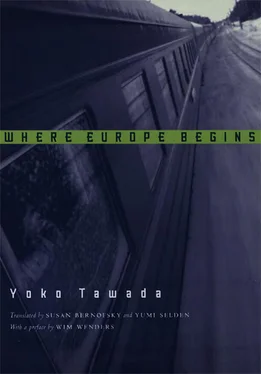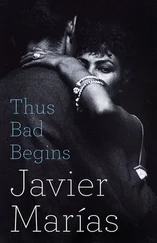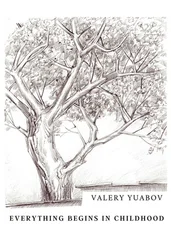The moon was full. The monk fell asleep reading a prayer book. Fast asleep, he walked through the forest to the pond.
The monk walks along the edge of the pond and sees the moon in the water.
He sees it with closed eyes, for he is asleep.
Seeing it does not cause him to awaken.
Awakening would not help him to see.
He leaps into the water.
And?
He drowns.
He drinks.
He drinks the water. He drinks the moon.
He wanted to embrace the moon. But now he’s
drunk it.
And he drowns.
Who are you?
I like to read, and I take walks at night when I
can’t fall asleep. I always see exactly
what I’ve just read.
You see what you’ve read in the water.
You see it in the sky.
The monk doesn’t just leap into the water straight off.
He glances to the right and left.
He glances up and notices there is no moon in the sky.
I beg your pardon?
The moon as such does not exist. There is only its
reflection in the water.
Perhaps you just can’t see it.
Seeing doesn’t mean much.
Perhaps the moon is just missing today.
It’s never been there.
Then why does the monk see the moon’s reflection in
the water?
The reflection is from yesterday.
Or the moon is from yesterday.
You can’t see yesterday’s moon.
The moon no one sees belongs to yesterday.
It’s in the wrong time.
You can’t help but see wrong what
lives in the wrong time.
The monk sees with the wrong gaze.
No, the moon just appears at the wrong moment.
Even a right moon can be wrong
at the wrong moment.
The moon no one sees is a wrong moon.
Something no one sees can’t be wrong.
The monk doesn’t even notice he’s seeing
a wrong moon.
The moon doesn’t know it’s being seen
as a wrong moon.
It’s only a reflection.
A reflection is never wrong.
It’s not a reflection, it’s a water moon.
The monk sees a moon made of water.
This moon is fluid. It is not superficial.
It is only superficial when seen.
It is no longer superficial when touched.
The hand that has touched it is wet.
One day later the newspaper reported the monk’s suicide. Many in the village were surprised, since it was rare for a monk to die in this way. Only now did they realize how little they knew about his life. They had seldom seen him. When they conversed with him, he spoke only of death. But this was only because of his profession. It didn’t occur to any of them that the monk, too, would one day die. Some said that he had probably fallen into the pond and drowned by accident. Others said this was impossible, as the monk was an excellent swimmer. When he was still a small child, he liked to swim in the pond as much as all the other village children. After becoming a monk he stayed out of the water, for he had come to revere it.
The monk leaps into liquid, to embrace liquid.
He does not drown. He clings to the water moon.
His hands are wet.
For a dissolving gaze there is nothing more solid than
water. For water there is nothing more solid
than a human gaze.
The monk gazes upon the water with closed eyes.
He does not swim. He sits upon water.
He lies down on water. He does not know where the
sky is, where the earth.
He who can forget the sky does not sink.
Who are you.
I talk too much and write too little.
He who sits near the water speaks a great deal.
The water supports all conversations.
He who lies upon the water has ceased to speak.
Who are you?
I swim too often and speak too seldom.
A girl from the village walked to the pond. Her mother had told her the monk had died there. It was a quiet afternoon. The sky grew darker and darker, the air cooler. Then a wind sprang up and unsettled the water’s surface. The girl heard a sound from beneath the water.
What do you hear now?
I hear a water sound.
Every water sound casts some light.
Let there be light! And there was sound.
It is bright.
Can you see more now?
No, it is too loud here. That’s why you can hardly see.
In sleep, one sees only by hearing.
What do you see now?
I hear a water sound.
In the nocturnal landscape the monk washes his hands.
Because his hands are too clean. He rinses away their
cleanness.
He washes his hands with the wind.
And the wind has the form of a wave.
The wave reaches the monk, and he is wet.
The monk does not unclothe.
He never shows himself naked.
In his robe he sits upon the water.
The folds of his robe become waves.
One newspaper article said the monk had been found naked. The corpse was floating on the water when a fisherman came to gather insects.
The girl wanted to find the dead monk’s robe. If it was true he had been found naked, his robe had to be somewhere near the pond. After a while it grew dark. The mother was waiting at home for the girl. She thought the girl had gone to the next village to visit her old teacher. The girl looked for the robe and couldn’t find it. Disappointed, she sat down and gazed into the water. Something gleamed: it was a book.
The monk never unclothes.
He never parts from his robe.
He parts only from his prayer book.
He throws the book into the pond.
And it sinks into the water.
The water is cold.
But the book does not drown. The texts can breathe
without air.
The book lies underwater.
The monk has nothing left to read. He has time now
to drown.
Anyone can swim. But only he who knows that the
water has no form can drown. Only he who
knows that his body has no form can drown.
Only he who reads can drown. That water and body
are formless can be found only in the book.
The book lies in the water.
It glows as the sky darkens.
From outside the water the book cannot be read.
The monk leaps into the water to read the book.
And he drowns.
He sinks beneath the water and sees not a splinter of
the moon.
He sees the splinters of the reflection.
When the monk leaps into the water the image on its
surface shatters.
The girl squatted down, stretched out her arms toward the book and tried to reach it. The soil beneath her feet was soft and subsided, and the water was much deeper than it had appeared. The girl fell into the cold water and drowned. That night there was no moon.
The moon sees the monk in the water, reading the
prayer book.
The moon leaps into the water to embrace the monk.
It shatters.
It splinters.
The splinters scatter through the water.
The pond now is empty.
In the empty pond lies a book.
And a monk who is reading the book.
And the moon which is embracing the monk.
And a girl who is dead.
Once upon a time.
You are now. You are here.
Kinoko-san says “disheard” instead of “misheard.” At first I thought it just sounded that way because my eardrums have gotten loose, but no matter how many times I hear her say it, it really does sound like “disheard.”
Sometimes I almost get up the nerve to correct her: “It’s not ‘disheard,’ actually. One says 'misheard.’” But then I swallow my unspoken words.
Every morning at six, Kinoko-san arranges the neckline of her kimono just so, draws herself up straight and smiles with her shiny cheeks and kindly-looking crow’s feet. Even when I’m absolutely certain about something, she can dismiss it with a bright laugh, saying, “I myself might think the same if I were just a bit younger.”
Читать дальше












